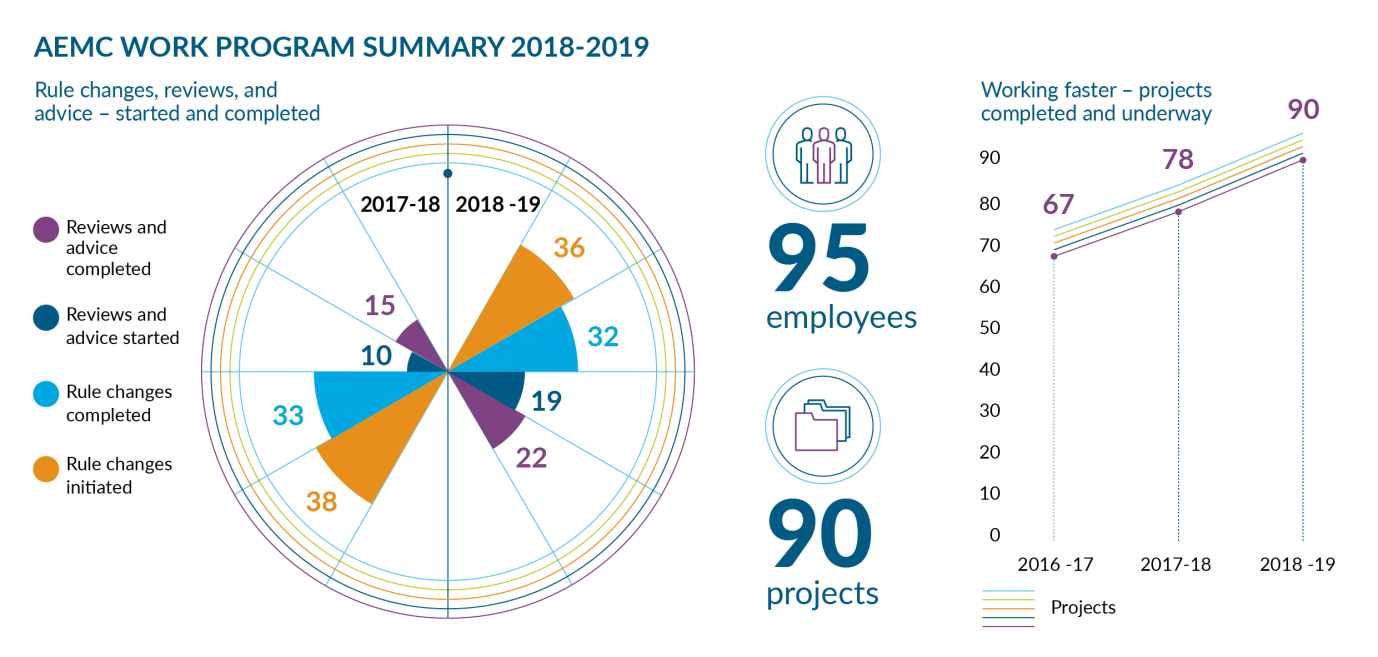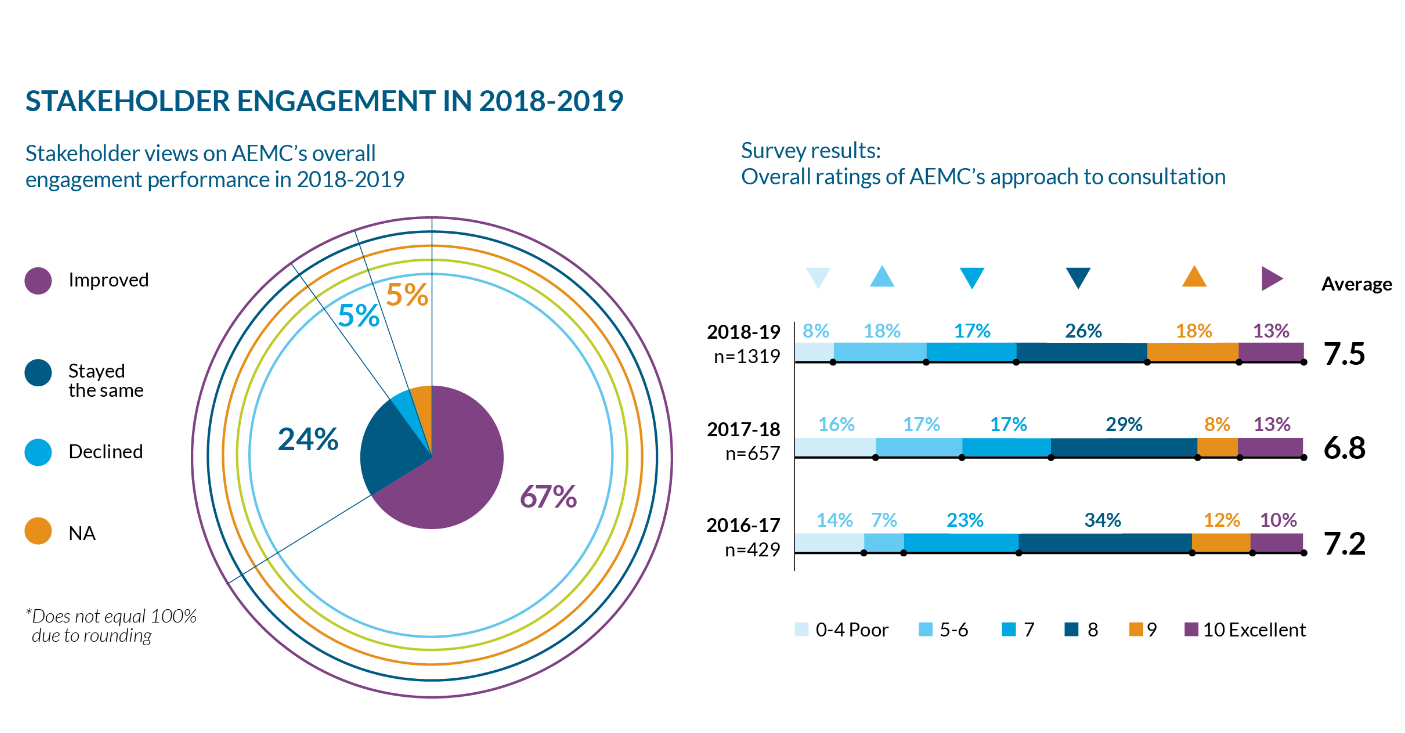The AEMC’s work to redesign the energy market is accelerating and we remain committed to meaningful consultation with you all. Over the past year we have changed the way we work in response to feedback to our ongoing stakeholder consultation surveys.
By Anne Pearson, Chief Executive
Keeping costs down for consumers as the system changes is our top priority
Australia’s power system is changing from top to bottom faster than just about anywhere else in the world. For some years now all the market bodies have been working together to profoundly change the way we manage the system. We are collaborating on issues that ultimately have big impacts on families and business. The cost of change is the key consideration in our work on reliability standards, security, consumer protections, and the electricity and gas networks of the future.
In examining issues that are important for market development we are of course focussed on the rising level of intermittent power in the national electricity market. We know people are interested in renewable energy and want to help fight climate change. The task now is to support a smooth transition at least cost to consumers so the system can keep delivering reliable, safe, and secure energy
Our workload increased significantly in the past year under review. At 30 June 2019 we had made 32 new rules, completed 22 review and advice projects with another 36 projects underway and continuing into the new financial year. That was a 15% productivity increase for an organisation still the same size as in years prior.
Over the past year our rule changes and reviews have gone directly to areas of importance for the Australian Energy Market Operator, the Australian Energy Regulator and the Energy Security Board including:
- processing rule changes from AEMO on matters such as enhancements to the Reliability Emergency Reserve Trader, frequency control management, interventions compensation and settlement
- processing rule changes from the Chair of the Energy Security Board and other policy work to support the implementation of the Integrated System Plan
- supporting the Energy Security Board’s 2025 market design project.
To achieve these efficiency gains we have reviewed the way we manage both rule making and review processes. Today we often conduct reviews and associated rule changes in parallel, working closely with stakeholders who decide they may want to submit rule requests during the course of a review project. We are also grouping rule requests when they relate to similar issues, starting them sooner and finishing faster.
We have brought modelling capacity in-house to better serve our stakeholders’ needs for timely and relevant advice on a range of matters and to strengthen our own decision making. We routinely establish technical working groups and expert advisory groups in order to involve stakeholders in our most complex work and enable them to help test our thinking. To this end our economic analysis team has established a quarterly forum for investors and analysts providing a platform for discussion around issues relating to new investments in the energy sector.
Valuing our stakeholders
We have continued to expand stakeholder engagement to reach a broader range of stakeholders and to consult at a detailed level on critical reforms made through our rule changes and reviews.
Stakeholder consultation surveys
As part of our commitment to continual improvement of our engagement and communication, in FY19 we invited 1319 stakeholders to participate in quarterly online surveys about projects in which they were actively involved. This survey program started in 2014-2015. We initiated surveys for thirty per cent of completed projects in which we asked stakeholders to provide feedback and recommendations on our consultation processes.
The 16 rules and review projects we surveyed were selected to source feedback from a wide range of stakeholder types across different focus areas. We were pleased to receive responses from 18 per cent of individuals who shared their opinions about how we interacted with them and provided valuable recommendations about steps we can take to enrich our stakeholder engagement.
The average consultation rating this year was 7.5 (out of 10). Two-thirds of respondents rated the AEMC’s overall approach to the review or rule change they participated in as quite good, very good or excellent (7 or more out of 10). Stakeholders said they were aware of our efforts to continuously improve our engagement processes and that we continue to take action on the feedback we receive, wherever possible.
Face-to-face engagement was particularly valued in this respect and respondents welcomed the involvement of senior executives in engagement activities. Respondents who believed the AEMC has improved its overall engagement performance also noted the organisation has increased its output and is working smarter. They appreciated the organisation has been finding new ways to deliver outcomes for industry and consumers, more quickly. Although, for some this is tempered by an acknowledgment that the sector still has a way to go.
We are already focused on what further action we can take to improve our performance in relation to stakeholder expectations. Stakeholders said they wanted to see more:
- direct contact to widen the reach of project information provided through newsletters and the website.
- information on the rulemaking process including workshops at industry events to explain our consultation process especially for new entrants.
- diversified locations for forums and workshops and provide a higher level of videoconferencing
- earlier notification of workshop dates and agendas along with requests to slow the pace of consultation and change to accommodate stakeholder resource constraints.
Extent of engagement
Between July 2018 and June 2019, key AEMC staff participated in more than 1000 formal meetings and forums with governments, market bodies, industry participants and consumer groups. We held 28 of our own formal stakeholder forums and workshops, several of which were also webcast to encourage the participation of stakeholders who weren’t available to attend in person.
Engagement with international energy market bodies
The AEMC actively engages with international energy market bodies that cooperate on global issues affecting energy markets. Our Commissioners and executive leadership team meet regularly with representatives from the New Zealand Electricity Authority and Ofgem, the UK’s Office of Gas and Electricity Markets.
International engagement enables us to benefit from the experience of others and provides a forum to share insights drawn from the high quality analytical work undertaken by Australia’s own energy market institutions. The AEMC is a member of the International Confederation of Energy Regulators (ICER) – an international body whose membership includes more than 200 regulatory authorities around the world. ICER’s aim is to improve policy-makers’ awareness and understanding of energy regulation and its role in addressing energy regulation issues in an international context. Through ICER, regulators exchange information about good practices in energy regulation. The AEMC representative on the ICER Steering Committee is our Chairman John Pierce.

